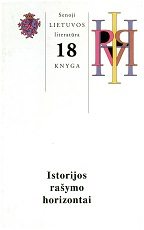Žanro samprata XVIII amžiaus poetikose ir retorikose: Filipo Nereuszo Golanskio poetikos tradiciškumas ir modernumas
Conception of Poetry and its Genres in the Poetics And Rhetorics of the 18th century: the Traditionality and modernity of the Poetic by Filip Nereusz
Author(s): Asta VaškelienėSubject(s): Literary Texts
Published by: Lietuvių literatūros ir tautosakos institutas
Keywords: the work O wymowie i poezyi from Scholarum Piarum by Professor of Rhetoric Golanski
Summary/Abstract: In this article, work O wymowie i poezyi from Scholarum Piarum by Professor of Rhetoric Golanski gets introduced at some length. The structure of this work indicates adherence of its author to the literary conception, primarily formulated by Aristotle and facing both rhetoric and poetry with the same tasks (docere, movere, delectare). Besides, these spheres were also linked by their mutual pedagogical and didactical function. The second half of the rhetoric and poetic by Golaƒski, dedicated to poetry, closely follows the structure of a typical school poetic of the 17th–18th centuries: the general categories of poetry get discussed in the first place, while specifications of poetical genres follow afterwards. The definition of poetry, as formulated by Golaƒski, rather than emphasizing some theoretical aspects, ascribes the main role to the imagination and expression of the creator. This is a novel conception of poetic creativity, transcending limits of ars and doctrina, as well as demonstrating separation of poetry from rhetoric. The definition of poetry is also supplemented and fleshed out by elaborating on the goals of poetry, by discussing connection between imagination and poetic creativity, and by defining the poetical style. Drawing on assertions by Horace, Golaƒski extends the goals of poetry defined by him, placing special emphasis on the importance of imagination and revealing the opposition between fiction and formal features of the poetical text. Poetry is classified into the internal (i. e. imitation of nature) and external (ways of versification). Further, Golanski subdivides poetry according to the three ways of imitation, following Aristotle along with Iuventius. Golanski defines specific genres of poetry according to different criteria. When discussing epigram, he first explains the origin of the term, then goes on to point out its main features (brevity and clarity), to discuss its structure, while stopping short of wider comments on the metrics. When discussing satire, he mostly dwells on its didactical function and possibilities of creative imagination. Elegy, according to him, is a rather universal genre, lacking precise terms for definition. Therefore he just points out its antique origins, thematic variety, and versification. The definition of ode boasts special originality: here, much attention is devoted to the expressive qualities of this genre, its mood and themes as well as volume, while formal features like structure or metrics get hardly mentioned at all. The latter features escape comments also in the discussion of bucolic. While describing its essence, Golaƒski elaborates on the synonymy of terms as well as peculiarities of contents and mood of the whole composition. This work by Golanski saw numerous editions...
Journal: Senoji Lietuvos literatūra
- Issue Year: 2004
- Issue No: XVIII
- Page Range: 225-251
- Page Count: 27
- Language: Lithuanian

